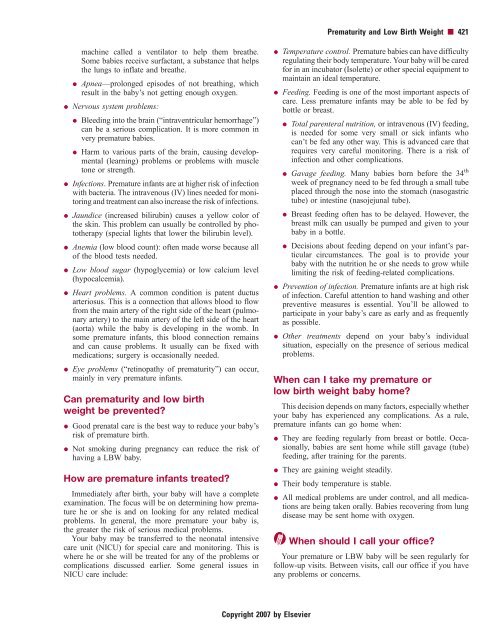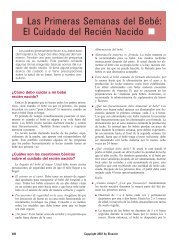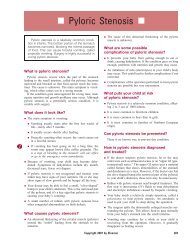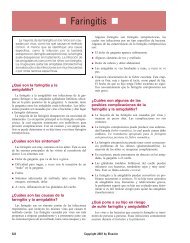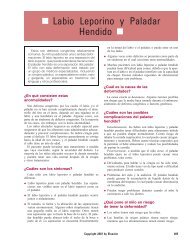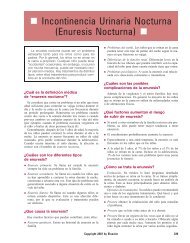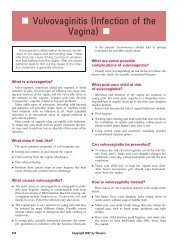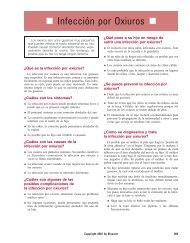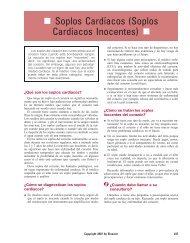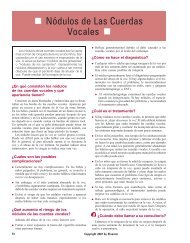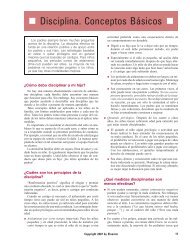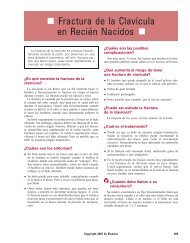Prematurity and Low Birth Weight - Impcna.com
Prematurity and Low Birth Weight - Impcna.com
Prematurity and Low Birth Weight - Impcna.com
Create successful ePaper yourself
Turn your PDF publications into a flip-book with our unique Google optimized e-Paper software.
<strong>Prematurity</strong> <strong>and</strong> <strong>Low</strong> <strong>Birth</strong> <strong>Weight</strong> n 421machine called a ventilator to help them breathe.Some babies receive surfactant, a substance that helpsthe lungs to inflate <strong>and</strong> breathe. Apnea—prolonged episodes of not breathing, whichresult in the baby’s not getting enough oxygen. Nervous system problems: Bleeding into the brain (“intraventricular hemorrhage”)can be a serious <strong>com</strong>plication. It is more <strong>com</strong>mon invery premature babies. Harm to various parts of the brain, causing developmental(learning) problems or problems with muscletone or strength. Infections. Premature infants are at higher risk of infectionwith bacteria. The intravenous (IV) lines needed for monitoring<strong>and</strong> treatment can also increase the risk of infections. Jaundice (increased bilirubin) causes a yellow color ofthe skin. This problem can usually be controlled by phototherapy(special lights that lower the bilirubin level). Anemia (low blood count): often made worse because allof the blood tests needed. <strong>Low</strong> blood sugar (hypoglycemia) or low calcium level(hypocalcemia). Heart problems. A <strong>com</strong>mon condition is patent ductusarteriosus. This is a connection that allows blood to flowfrom the main artery of the right side of the heart (pulmonaryartery) to the main artery of the left side of the heart(aorta) while the baby is developing in the womb. Insome premature infants, this blood connection remains<strong>and</strong> can cause problems. It usually can be fixed withmedications; surgery is occasionally needed. Eye problems (“retinopathy of prematurity”) can occur,mainly in very premature infants.Can prematurity <strong>and</strong> low birthweight be prevented? Good prenatal care is the best way to reduce your baby’srisk of premature birth. Not smoking during pregnancy can reduce the risk ofhaving a LBW baby.How are premature infants treated?Immediately after birth, your baby will have a <strong>com</strong>pleteexamination. The focus will be on determining how prematurehe or she is <strong>and</strong> on looking for any related medicalproblems. In general, the more premature your baby is,the greater the risk of serious medical problems.Your baby may be transferred to the neonatal intensivecare unit (NICU) for special care <strong>and</strong> monitoring. This iswhere he or she will be treated for any of the problems or<strong>com</strong>plications discussed earlier. Some general issues inNICU care include: Temperature control. Premature babies can have difficultyregulating their body temperature. Your baby will be caredfor in an incubator (Isolette) or other special equipment tomaintain an ideal temperature. Feeding. Feeding is one of the most important aspects ofcare. Less premature infants may be able to be fed bybottle or breast. Total parenteral nutrition, or intravenous (IV) feeding,is needed for some very small or sick infants whocan’t be fed any other way. This is advanced care thatrequires very careful monitoring. There is a risk ofinfection <strong>and</strong> other <strong>com</strong>plications. Gavage feeding. Many babies born before the 34 thweek of pregnancy need to be fed through a small tubeplaced through the nose into the stomach (nasogastrictube) or intestine (nasojejunal tube). Breast feeding often has to be delayed. However, thebreast milk can usually be pumped <strong>and</strong> given to yourbaby in a bottle. Decisions about feeding depend on your infant’s particularcircumstances. The goal is to provide yourbaby with the nutrition he or she needs to grow whilelimiting the risk of feeding-related <strong>com</strong>plications. Prevention of infection. Premature infants are at high riskof infection. Careful attention to h<strong>and</strong> washing <strong>and</strong> otherpreventive measures is essential. You’ll be allowed toparticipate in your baby’s care as early <strong>and</strong> as frequentlyas possible. Other treatments depend on your baby’s individualsituation, especially on the presence of serious medicalproblems.When can I take my premature orlow birth weight baby home?This decision depends on many factors, especially whetheryour baby has experienced any <strong>com</strong>plications. As a rule,premature infants can go home when: They are feeding regularly from breast or bottle. Occasionally,babies are sent home while still gavage (tube)feeding, after training for the parents. They are gaining weight steadily. Their body temperature is stable. All medical problems are under control, <strong>and</strong> all medicationsare being taken orally. Babies recovering from lungdisease may be sent home with oxygen.When should I call your office?Your premature or LBW baby will be seen regularly forfollow-up visits. Between visits, call our office if you haveany problems or concerns.Copyright 2007 by Elsevier


